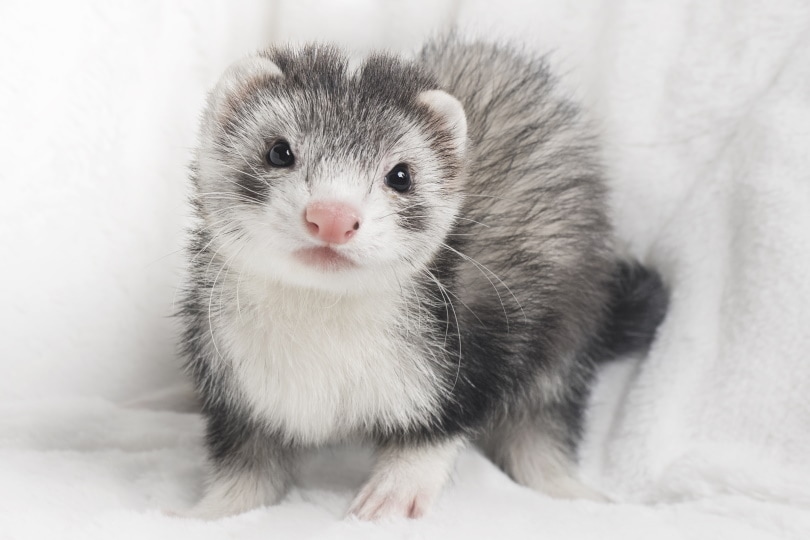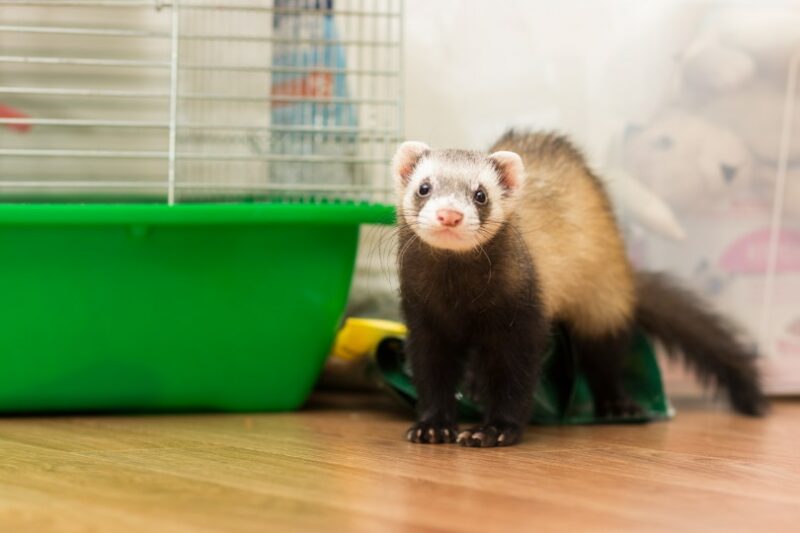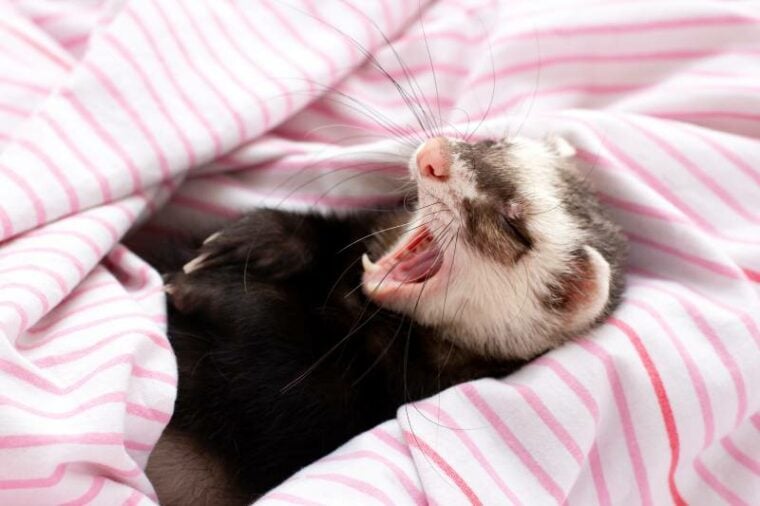
If you’re thinking about getting a pet ferret and are wondering if they smell, you’ve come to the right place. Ferrets naturally have a somewhat “musky” smell – which is much stronger in pets that aren’t sterilized (especially intact males). However, ferrets that are adopted as pets are often sterilized and rarely produce a strong odor under normal circumstances.
Their smell tends to bother some owners, but over time, most people will get used to it. However, if you’re particularly sensitive to smells, you might not appreciate the mild scent of a pet ferret.
Hygiene does wonders to ensure that your pet doesn’t make your house too smelly. Ferrets that are in a clean environment are also typically healthier. Therefore, by keeping your environment clean, you can often minimize much of the smell associated with a ferret.
Why Do Ferrets Smell?
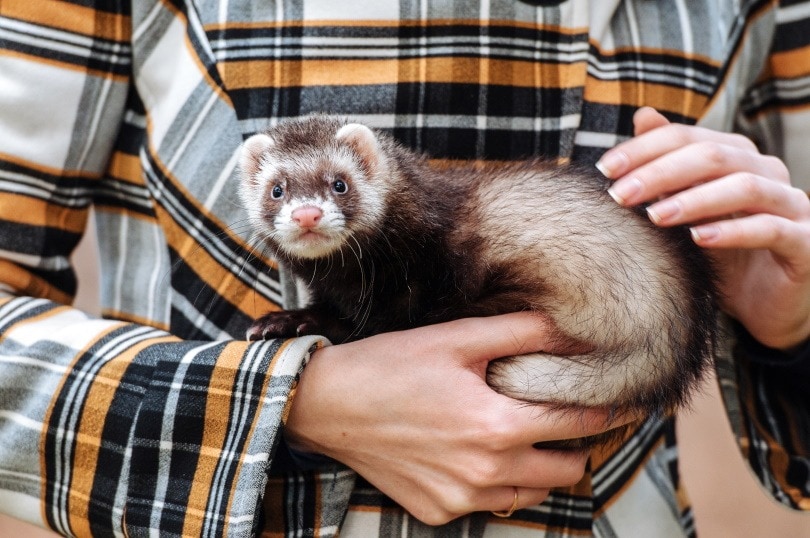
Ferrets that aren’t sterilized produce a strong, musky odor. Under normal conditions, no pet ferret should be adopted while still being intact. For their health, they are sterilized while still young. During this procedure, their anal scent glands (which contribute to the production of these scents) are also removed.
It is very important to note that a female ferret should be sterilized well before her first heat to prevent life-threatening consequences such as the development of hyperadrenocorticism. A female that is in heat will stay in heat until she’s mated, and this produces a physiological state of stress within their body.
An intact male can further add to smell problems around your house because in addition to their natural musky odor, they will also urinate on surfaces to mark their territory. This includes urinating on you when you handle them. Therefore, it is very important to adopt a pet that’s sterilized. You should consult your veterinarian if your ferret is still intact.
A healthy, sterilized pet ferret has a very mild scent, that isn’t overbearing or overpowering. Ferrets produce oils from their sebaceous glands which are located all over their body. This smell is relatively mild and not something you can entirely eliminate. If you notice a particularly strong odor from your pet, you should have them looked over by your veterinarian, as it might be due to an underlying health issue.
For most pet owners, the “smell” associated with ferrets isn’t always emanating from the ferret. Rather, it tends to become overbearing when a ferret repeatedly rubs against familiar surfaces (such as their litter box, hammock, or favorite hang out spot), repeatedly depositing their scent on inanimate objects for long periods of time.
How to Minimize Ferret Smells Around Your House
The best way to combat the smell of a ferret around your house is to practice routine cleanliness, with a special focus on the places your ferret frequently spends time and objects that you associate with your ferret.
All pet ferrets require exercise and should be let out of their cage on a daily basis to play and exercise. Knowing your ferret’s favorite spots will help you know where you need to concentrate your cleaning efforts. Among these is their litter box. Ferrets can be litter trained, and given how short their digestive tract is, you can expect them to make multiple visits to their litter box on a daily basis. Cleaning the litter box ensures that your ferret stays healthy and your house smells nice as well.
Placement of the litter boxes is crucial too. As previously mentioned, ferrets have a very short digestive tract, and therefore, if their litter boxes are too far away, they may have accidents outside the box if they can’t make it to them in time. Obviously, accidents outside the litter box will produce a very strong odor and should be immediately cleaned to prevent repeated incidents.
Your ferret will likely have a favorite hammock or resting spot. As you may imagine, this surface will be in prolonged contact with their bodies, and therefore, more of their scent will be deposited on these surfaces. Over time, these surfaces will begin to smell. Therefore, regularly cleaning these surfaces and fabrics will help control the smells around your home.
Ferrets are social and often enjoy mingling with their owners. It goes without saying that your clothes might pick up some of their scent. Ensuring you’re not mixing your “ferret” outfits with your other clothes will help keep your wardrobe smelling fresh. Many ferret owners have specific outfits for interacting with their pets.
When You Should Worry
Under normal circumstances, a mild smell from your pet is of no concern. However, if you seem to be noticing a very pungent smell from your pet, it definitely warrants a visit to their vet. This change in their odor might be accompanied by other signs.
If you notice these signs, you should promptly take your ferret to the vet.
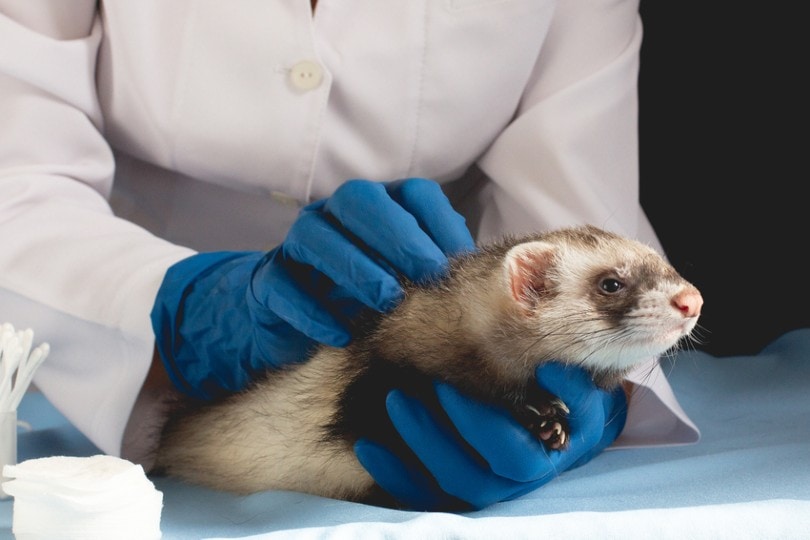
Bathing Your Pet
Grooming your ferret correctly can help maintain their coat and, at times, a bath might be necessary if they’ve soiled themselves and are smelling unpleasant. Ferrets are not opposed to napping in weird places, including their litter boxes and therefore, at times, they can indeed become far too smelly to tolerate. In such a situation, you can bathe your pet. If you’re not confident with bathing your pet, you should have a professional grooming service do this for you.

Final Thoughts
Intact ferrets do naturally produce a musky smell. It is produced by the ferret’s scent glands and is used to mark their territory. All pet ferrets should be sterilized for their own health, and this process is usually accompanied by removing their scent-producing anal glands, which largely minimizes the amount of odor they produce.
In addition, ferrets produce secretions from their sebaceous glands which can accumulate on surfaces over time and lead to an unpleasant smell.
Cleaning your ferret’s toys and cage and grooming them regularly are essential for scent control. Oils will build up on your ferret’s favorite toys and equipment, which can increase the smell. Luckily, controlling the smell is relatively easy with basic cleaning and grooming routines.
If your pet seems to produce a strong, unexplained odor, you should have them looked over by a veterinarian.
Related Reads:
Featured Image Credit: Irina Vasilevskaia, Shutterstock


